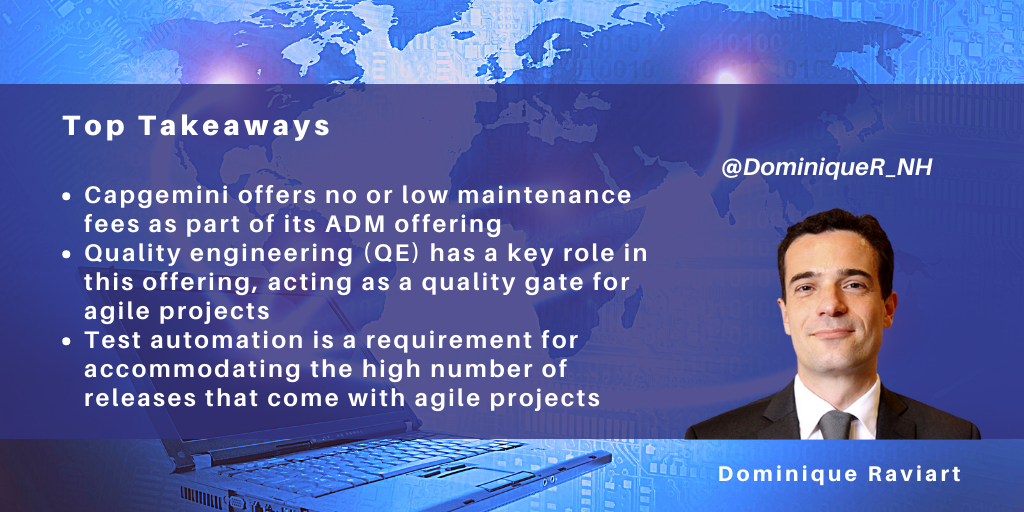Search posts by keywords:
Filter posts by author:
Related NEAT Reports
Other blog posts
posted on Jul 02, 2021 by Dominique Raviart

Capgemini is aiming for low or no maintenance and support fees as part of its ADM offering. Depending on its level of responsibility for development activities, the company commits to reducing maintenance and support activities and is, therefore, making a bold statement unheard of in the IT industry.
To achieve such high aspirations, the company believes Sogeti's application testing – or quality engineering (QE) – plays a central role. Such a ‘quality gate’ is hardly new, but its role has evolved with the adoption of agile development methodologies. Agile, with its frequent releases to production, has accelerated the demand for functional test automation. Clients are spending more on automation and targeting in-sprint automation, where the features of a new release are already functionally automated, limiting the level of manual testing activity.
Capgemini highlights it has significantly invested around continuous testing and AI.
With continuous testing, Capgemini has integrated the DevOps tools with test execution software. The company continues to expand the scope of such continuous testing platforms to include support activities such as test data management with synthetic data, test environment provision, and service virtualization. Capgemini has gone beyond functional testing to non-functional (with application security playing an increased role) and static code analysis tools. The expansion continues.
Capgemini’s Sogeti also brings its investments in AI. Currently, most AI use cases focus on ‘better’ testing, with test defect prediction and test case optimization as quick wins. NelsonHall sees an increase in the number of AI use cases quarter after quarter, e.g., matching agile user stories with test cases. We think the creativity of firms like Capgemini to identify better ways of testing is limitless, provided clients have enough quality data internally.
AI use cases in testing expanded a couple of years ago from better testing to test automation. Recent use cases enable users to automate the test script creation phase and sometimes the test case stage. A particularly promising technology is next-gen record-and-playback AI-based tools. Capgemini’s tool will record the transaction and translate it into a test script. It will also scan the application under test, identify changes in objects, and update scripts accordingly. This is the beginning of automated test script maintenance, the QE industry’s most significant challenge.
Unsurprisingly, Capgemini’s QE automation approach has several requirements. For example, the company targets multi-year mid-sized to large deals, whose size will help Capgemini recoup its test automation investments. The company also looks for build-test-run contracts to control QE and build activities, whether application development or systems integration, e.g., SAP programs.
Capgemini aims to bring digital and cloud capabilities to its application development activities. The company targets application resilience, scalability, and security, with application migration to the cloud as a central element. Again, QE plays a crucial role in testing these attributes.
NelsonHall believes that Capgemini has made a bold move with its low/no maintenance fees value proposition. This offering comes at the right time. With the pandemic, clients have reignited large application services deals, with offshoring and automation as fundamental principles. Clients have cost savings on the agenda if only to leave more budget for digital projects.
